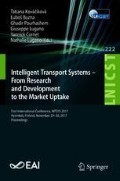Abstract
Vehicular Ad hoc Networks (VANETs) became a thoroughly studied topic in the last years both by the academic community as well as by the automotive industry stakeholders. Because of their potential to save lives, make the transport more efficient and green, it is very important to understand their specific behavior and to resolve their known issues. This paper aims to study the performance of the VANETs in a very dense traffic conditions by the means of a computer modelling. The scenario in these simulations was deliberately chosen to represent the worst possible communication cases. Even though the communication in such extreme conditions is unlikely to occur in real-life situations, it is vital to find out, where are the communication limits of the VANETs.
Access this chapter
Tax calculation will be finalised at checkout
Purchases are for personal use only
References
Abdelgader, A.M.S., Lenan, W.: The physical layer of the IEEE 802.11p WAVE communication standard: the specifications and challenges. In: Proceedings of the World Congress on Engineering and Computer Science 2014, vol. II. Newswood Limited (2014)
ECC Decision (08)01: ECC Decision of 14 March 2008 on the harmonized use of the 5875–5925 frequency band for Intelligent Transport Systems (ITS)
ETSI: Draft ETSI EN 302 571, Intelligent Transport Systems; Radiocommunications equipment operating in the 5855 MHz to 5925 MHz frequency band; Harmonized EN covering the essential requirements of article 3.2 of the R&TTE Directive
ETSI: Technical Specification ETSI TS 102 687, Intelligent Transport Systems (ITS); Decentralized Congestion Control Mechanisms for Intelligent Transport Systems operating in the 5 GHz range; Access layer part
Sun, W., Zhang, H., Pan, C., Yang, J.: Analytical study of the IEEE 802.11p EDCA mechanism. In: Intelligent Vehicles Symposium (IV). IEEE (2013)
Purkovic, A., Burns, N., Sukobok, S., Demirekler, D.: LDPC vs. Convolutional Codes for 802.11n Applications: Performance Comparison. IEEE (2004)
Acknowledgements
Research described in the paper was supported by the ERAChair Eradiate - Enhancing Research and innovation dimension of the University of Zilina in intelligent transport systems, Grant agreement no: 621386, Project 7thFP.
Author information
Authors and Affiliations
Corresponding author
Editor information
Editors and Affiliations
Rights and permissions
Copyright information
© 2018 ICST Institute for Computer Sciences, Social Informatics and Telecommunications Engineering
About this paper
Cite this paper
Petrov, T., Ďurček, V., Dado, M., Ambrosch, K.E. (2018). Study of Performance of the Vehicular Ad Hoc Networks in Dense Network Scenarios. In: Kováčiková, T., Buzna, Ľ., Pourhashem, G., Lugano, G., Cornet, Y., Lugano, N. (eds) Intelligent Transport Systems – From Research and Development to the Market Uptake. INTSYS 2017. Lecture Notes of the Institute for Computer Sciences, Social Informatics and Telecommunications Engineering, vol 222. Springer, Cham. https://doi.org/10.1007/978-3-319-93710-6_10
Download citation
DOI: https://doi.org/10.1007/978-3-319-93710-6_10
Published:
Publisher Name: Springer, Cham
Print ISBN: 978-3-319-93709-0
Online ISBN: 978-3-319-93710-6
eBook Packages: Computer ScienceComputer Science (R0)

